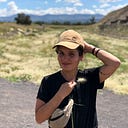This is not about technology, it’s about people
A little story about a sociologist working with trustworthy AI
I’ve been working with computing, digital security and research for some years, and a lot of people ask me: “how did you get here, and why?”. Today I’m going to tell you a bit of my story.
My silences had not protected me. Your silence will not protect you. But for every real word spoken, for every attempt I had ever made to speak those truths for which I am still seeking, I had made contact with other women while we examined the words to fit a world in which we all believed, bridging our differences.
Audre Lorde, Sister Outsider, 1984.
When I was 16 years old, I found myself working in a Minor Apprenticeship Program (Programa Menor Aprendiz) in a big nonprofit organization. As many of us do at that point in our lives, I kept asking myself what my mission was in the world. I’ve seen a lot of social inequality my whole life, as the daughter of parents who work with indigenous groups in Brazil. Much of this inequality was related to access to information, culture, education, health, and food, among other issues. During a fateful day at work when I was sixteen years old, I was reading a mass media magazine and an article caught my attention. It was about a movement called “The Revolution Will Not Be Televised”, referring to a new movement of taking back the media called Indymedia, linking it to the 1999 Seattle WTO protests.
With the catch phrase “don’t hate the media. be the media,” the Indymedia Network called people to action — to take back their power of speech, to produce content collectively, and to share it online. In 2004, the Internet was still entering the houses in my old town, Goiânia, and smartphones were not a reality. Back then, the disinformation was fought with the right of reply in the big newspapers.
I started to volunteer at my local Indymedia collective, where I stayed from 2004 to 2012. There, I learned about collective action and collaboration, how to work openly, autonomously, and especially how to produce content for change for a better world. And, with all that, how to integrate technology into these projects for greater impact. At Indymedia, I learned the power that united people can create — and the challenges we have to face when doing so. During those years, I met many people from different places, countries, cultures — some of them are still good friends or even co-workers and collaborators.
Things are pretty different in 2019. Brazil is going through a major political-economic crisis, as well as recurrent environmental disasters. The information we get from the media flies by so quick it seems hard to catch, as well to fact-check. Latin America is burning — and while there are people fighting for change, mass media and the independent media, as well the elections, all have something in common: the need to produce information quickly — and sometimes, misinformation — and therefore, the competition for the place to speak.
During the ten months of my Mozilla Fellowship, with the scope of “trustworthy AI”, I will investigate the production of information and misinformation in the Latin American context, talking directly with people that have had their lives impacted by fake news or who are struggling because of content targeting. Bringing with me more than ten years of experience working openly for human rights, I’m seeking not only to question, but also to create a space to share the desire for change and to create technology together, for humanity, not for innovation-sake. All of this with the support of my host organization Derechos Digitales, Mozilla Foundation, and all the fellows in the 2020 cohort.
The project results will be shared periodically through my communication channels (find me on pulse, twitter and linkedin), and we have our eyes on other projects and outputs. Looking for a change, I want to recall Ailton Krenak’s view about the end of the world, and how talking about other stories might help us with it:
My provocation about delaying the end of the world is that I can always tell another story. If we can do that, we will be postponing the end. It is important to live the experience of our own circulation around the world, not as a metaphor, but as a friction, to be able to count on each other.
When I think about creating technology and knowledge around tech, I want to share with you a phrase that stays with me. Almost ten years ago, a friend stated: “technology is grass, the important thing is people.” Like grass, AI, technology, and information can grow everywhere, anywhere. What is most important is to think about the change we want to see in people’s lives, in society, in individuals. Ultimately, my project is a project for change.
Special thanks to my colleague, Mozilla Fellow Petra Molnar, for reviewing this little piece.
